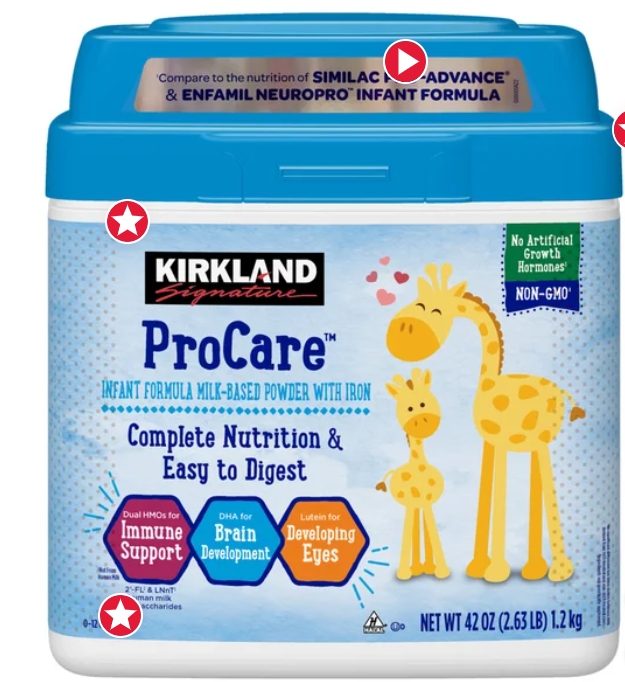
Kirkland Signature ProCare with Dual HMO’s, Non-GMO Infant Formula 42 oz, 2-pack
- 2′-FL and LNnt HMO’s For Immune Support & Digestive Health
- DHA To Support Brain Development
- Lutein To Support Eye Development
- No Artificial Growth Hormones
- Certified Kosher by the Orthodox Union–ⓊD and Certified Halal.
Navigating the World of Infant Nutrition with Costco’s Popular Store Brand
As a new parent, few decisions feel as consequential as choosing the right formula for your baby. With countless options lining store shelves—each claiming to be the best for your little one’s development—the process can quickly become overwhelming. If you’re a Costco member or simply looking for quality nutrition at a reasonable price, Kirkland Signature baby formula has become a popular alternative to premium national brands while providing comparable nutrition at a significant cost savings.
I remember standing in the baby aisle of my local Costco, sleep-deprived and confused, comparing labels and prices while my newborn fussed in her carrier. That day began my journey with Kirkland formula, and I’m sharing everything I’ve learned to help other parents make informed decisions about this warehouse store option.
Let’s explore everything you need to know about Kirkland Signature baby formula—from ingredients and types to cost comparisons and preparation guidelines—so you can decide if it’s the right choice for your growing baby.
What Exactly Is Kirkland Formula?
Kirkland Signature is Costco’s private label brand, covering everything from paper towels to organic eggs—and yes, baby formula. What many parents don’t realize is that Kirkland doesn’t actually manufacture their formula. Instead, it’s produced by Perrigo Nutritionals, one of the largest manufacturers of store-brand infant formulas in the United States. This same company produces many other store-brand formulas you might recognize.
The Kirkland formula line is designed to provide nutrition comparable to premium national brands like Similac and Enfamil, but at a more accessible price point. Each variety is formulated to meet the same FDA nutritional requirements as the name brands, containing essential nutrients babies need for healthy development.
What sets Kirkland formula apart from some other store brands is the attention to quality combined with value. While some parents initially worry about choosing a “generic” option for something as important as baby formula, understanding the manufacturing process and nutritional profile often alleviates these concerns.
Where Can You Purchase Kirkland Formula?
As you might expect, Kirkland Signature formula is available primarily at Costco warehouse locations across the United States and Canada. This exclusivity is both an advantage and potential drawback, depending on your location and shopping habits.
For Costco members, picking up formula during regular shopping trips is convenient. The warehouse typically stocks large quantities, reducing the frequency of purchases. However, if you don’t live near a Costco or don’t have a membership (which starts at around $60 annually), access becomes more complicated.
You can also purchase Kirkland formula through Costco’s website, though you’ll still need a membership. Occasionally, you might find Kirkland formula through third-party sellers on platforms like Amazon or eBay, but prices are typically marked up, negating the cost savings, and authenticity can’t always be guaranteed.
During formula shortages, as experienced in 2022, distribution may be limited even at Costco locations, with purchase quantities sometimes restricted to ensure more families have access.
The Price Factor: How Much Does Kirkland Formula Cost?
One of the most compelling reasons parents choose Kirkland formula is its exceptional value compared to national brands. The price difference can be substantial, especially when feeding a hungry, growing baby who might consume up to 32 ounces of formula daily.
As of my last shopping trip, Kirkland Signature ProCare Non-GMO Infant Formula typically costs around $0.51 per ounce when purchased in the large 42-ounce container. Compare this to Similac Pro-Advance, which averages about $1.15-1.30 per ounce, or Enfamil Premium, ranging from $1.10-1.25 per ounce.
For context, this means feeding your baby Kirkland formula could save approximately $120-150 per month compared to premium brands. Over a year of formula feeding, that’s a potential savings of $1,440-1,800—enough to cover other significant baby expenses like a crib, stroller, or even start a college fund.
The consistent pricing at Costco is another advantage. While supermarkets and drugstores frequently change prices on name brands, Costco tends to maintain stable pricing on their Kirkland products, making budget planning easier for families.
Safety First: Is Kirkland Formula Safe for Newborns?
The question of safety naturally tops the list for concerned parents. The reassuring answer is yes—Kirkland Signature formula meets all FDA standards for infant nutrition and safety. Like all infant formulas sold legally in the United States, Kirkland products must comply with strict regulatory requirements.
Perrigo, the manufacturer behind Kirkland formula, maintains rigorous quality control processes. Their manufacturing facilities are regularly inspected, and products are tested for contaminants and nutritional content before reaching store shelves.
It’s worth noting that during the 2022 formula recalls affecting some Abbott Nutrition products (makers of Similac), Kirkland formulas were not implicated. The formulas are produced in different facilities with separate supply chains.
For newborns specifically, the Kirkland ProCare formula is appropriate from birth, though parents of premature babies or those with special nutritional needs should consult their pediatrician before choosing any formula.
Formula Options: What Types of Kirkland Formula Are Available?
Costco’s formula lineup has evolved over the years to meet diverse infant needs, though their selection remains more streamlined than national brands. Currently, Kirkland offers three main formula varieties:
- Kirkland Signature ProCare Non-GMO Infant Formula: The standard offering, suitable from birth to 12 months. This milk-based formula contains added DHA, ARA, and prebiotics, designed to be nutritionally comparable to Similac Pro-Advance.
- Kirkland Signature ProCare Sensitive Non-GMO Infant Formula: Formulated for babies with lactose sensitivity, this option contains reduced lactose while providing complete nutrition. It’s comparable to Similac Pro-Sensitive.
- Kirkland Signature ProCare Advantage Premium Infant Formula: A newer addition to the lineup with enhanced nutritional components, including 2′-FL HMO (a prebiotic found in breast milk) and other immune-supporting nutrients.
Unlike some national brands, Kirkland doesn’t currently offer specialized formulas for specific concerns like colic, allergies, or premature infants. For babies with severe milk protein allergies or other medical conditions requiring specialized formula, parents may need to consider other brands.
The limited selection has both advantages and disadvantages. While there are fewer options to sort through, babies with specific needs might need to look elsewhere. Always consult your pediatrician if you’re unsure which formula type is appropriate for your baby.
Nutritional Profile: DHA, ARA and Other Key Nutrients
Modern parents are increasingly aware of the importance of specific nutrients in infant development. DHA (docosahexaenoic acid) and ARA (arachidonic acid) are long-chain fatty acids naturally found in breast milk that support brain and eye development.
Kirkland Signature formulas do contain both DHA and ARA, at levels comparable to national brands. The standard Kirkland ProCare formula contains 17mg of DHA per 100 calories, similar to the amounts found in Similac Pro-Advance.
Beyond these important fatty acids, Kirkland formulas include:
- Essential vitamins and minerals required by FDA standards
- Nucleotides to support immune system development
- Prebiotics (galactooligosaccharides) to promote digestive health
- Choline for brain development
- Antioxidants including vitamin E and selenium
The nutrient profile is designed to mirror breast milk as closely as possible, though like all formulas, it cannot perfectly replicate all the bioactive components of human milk. The ratios of proteins, carbohydrates, and fats are balanced to support healthy growth and development.
Comparative Analysis: Kirkland vs. Premium Brands
Many parents wonder how Kirkland formula truly compares to premium brands like Similac and Enfamil. Having personally compared the nutritional labels side-by-side, I found the similarities striking.
When comparing Kirkland ProCare to Similac Pro-Advance:
- Both contain milk-based protein with added whey for easier digestion
- Both include DHA, ARA in similar amounts
- Both contain similar caloric density (20 calories per ounce)
- Both use lactose as the primary carbohydrate
- Both include prebiotics to support digestive health
The primary differences appear in minor variations of ingredients and marketing approach. National brands often emphasize proprietary blends with trademarked names, while Kirkland focuses on providing equivalent nutrition without the marketing premium.
In terms of acceptance, most babies transition easily between Kirkland and name brands. The taste and texture are similar enough that many infants don’t notice a difference. However, as with any formula change, it’s wise to transition gradually if switching brands.
Organic Considerations: Is Kirkland Formula Organic?
For parents prioritizing organic ingredients, it’s important to note that standard Kirkland Signature formula is not certified organic. While the formula is marketed as non-GMO (genetically modified organism), it doesn’t meet the additional requirements for organic certification.
This differs from some premium brands that offer organic variants, such as Earth’s Best Organic or Similac Organic. The organic designation requires that ingredients come from farms that avoid synthetic pesticides and fertilizers, among other criteria.
The non-GMO status of Kirkland formula means the ingredients haven’t been genetically modified, which is important to many families, even without the full organic certification. The decision between organic and non-organic formula often comes down to personal priorities and budget considerations.
Ingredient Deep Dive: What’s Actually in Kirkland Formula?
Understanding what goes into your baby’s formula can help you make an informed decision. The standard Kirkland ProCare formula contains:
- Nonfat Milk: The primary protein source
- Vegetable Oils (Palm Olein, Soy, Coconut, High Oleic Safflower or Sunflower Oil): Provides essential fatty acids and fat content
- Lactose: The primary carbohydrate, same as in breast milk
- Whey Protein Concentrate: Makes the protein easier to digest
- Less than 2% of: Galactooligosaccharides (prebiotics), Potassium Citrate, Calcium Carbonate, Sodium Citrate, Magnesium Chloride, Calcium Phosphate, Potassium Chloride, M. Alpina Oil (source of ARA), C. Cohnii Oil (source of DHA), Ascorbic Acid, Soy Lecithin, Inositol, Zinc Sulfate, Ferrous Sulfate, Vitamin E, Niacinamide, Calcium Pantothenate, Copper Sulfate, Vitamin A Palmitate, Thiamine Hydrochloride, Riboflavin, Pyridoxine Hydrochloride, Folic Acid, Manganese Sulfate, Phylloquinone, Biotin, Sodium Selenate, Vitamin D3, Cyanocobalamin, Nucleotides, Taurine, L-Carnitine
The sensitive version has a similar ingredient list but with reduced lactose and added corn maltodextrin as an alternative carbohydrate source.
Parents concerned about specific ingredients should note that Kirkland formula:
- Does not contain added sucrose (table sugar)
- Does not contain artificial growth hormones
- Contains soy-based oils but not soy protein (relevant for some allergies)
- Contains palm oil, which some research suggests may impact calcium absorption
Lactose Content: Understanding Digestive Sensitivities
Standard Kirkland ProCare formula does contain lactose as its primary carbohydrate, similar to breast milk. This is appropriate for most babies, as lactose intolerance is actually rare in infants (unlike in adults).
For babies showing signs of lactose sensitivity, such as excessive gas, fussiness after feeding, or loose stools, Kirkland offers their Sensitive formula with reduced lactose content. This formula uses a combination of lactose and corn maltodextrin to provide necessary carbohydrates while easing digestive discomfort.
It’s important to distinguish between lactose sensitivity and milk protein allergy. Lactose is a sugar found in milk, while milk allergies are reactions to milk proteins. Babies with true milk protein allergies typically need extensively hydrolyzed or amino acid-based formulas, which Kirkland does not currently offer.
If you suspect your baby has digestive issues, consult your pediatrician before switching formulas, as symptoms might have other causes.
Sensitive Tummies: Finding the Right Formula Match
Parents of babies with sensitive digestive systems often struggle to find a formula that their little one tolerates well. Kirkland’s Sensitive formula can be a good option for babies experiencing:
- Mild to moderate fussiness
- Excessive gas
- Occasional spit-up
- Loose stools related to lactose sensitivity
The reduced lactose content and adjusted protein blend in the Sensitive formula makes it easier to digest for many babies. The formulation is comparable to Similac Pro-Sensitive, but at roughly half the cost.
However, Kirkland does not offer specialized formulas for more severe digestive issues, such as:
- Colic-specific formulas
- Anti-reflux thickened formulas
- Extensively hydrolyzed protein formulas for milk protein allergies
For babies with more significant digestive concerns, specialized formulas from brands like Nutramigen, Alimentum, or Neocate may be necessary, despite their higher cost. These medical conditions often qualify for insurance coverage or special assistance programs.
Allergy Considerations: Hypoallergenic Options
Unfortunately, Kirkland does not currently offer a hypoallergenic formula option. This is a significant limitation for families with babies who have confirmed milk protein allergies or severe sensitivities that don’t resolve with partially hydrolyzed or reduced-lactose formulas.
Hypoallergenic formulas fall into two main categories:
- Extensively hydrolyzed formulas (like Nutramigen or Alimentum), where proteins are broken down into smaller, less allergenic fragments
- Amino acid-based formulas (like Neocate or EleCare), which contain protein in its most basic form and are suitable for the most sensitive infants
Parents of babies with diagnosed allergies will need to consider other brands for these specialized formulas. While they come at a premium price, they’re essential for babies with true allergies. Some families find partial relief through assistance programs, insurance coverage, or flexible spending accounts to offset the higher costs.
Practical Considerations: Shelf Life and Storage
Kirkland formula typically has a shelf life of 12-24 months from the manufacturing date when unopened, depending on the specific product. The expiration date is clearly marked on each container.
Once opened, the formula should be used within 30 days, with the container tightly closed between uses and stored in a cool, dry place. Unlike some ready-to-feed formulas, the powdered Kirkland formula doesn’t require refrigeration until it’s mixed with water.
After mixing with water, prepared formula should be:
- Used immediately or refrigerated right away
- Discarded after 24 hours if refrigerated
- Discarded after 1 hour at room temperature if baby has drunk from the bottle
- Discarded after 2 hours at room temperature if untouched
These guidelines match standard safety recommendations for all powdered formulas and help prevent bacterial growth that could make your baby sick.
Consumer Feedback: What Parents Are Saying
Parents’ reviews of Kirkland formula tend to be overwhelmingly positive, particularly regarding value and performance. Common themes in reviews include:
“My baby transitioned from Similac to Kirkland without any issues, and we’re saving over $100 a month!”
“I was hesitant about ‘generic’ formula, but our pediatrician reassured us it meets all the same standards. Six months later, our baby is thriving.”
“The sensitive version was a game-changer for my gassy baby. Same relief as the name brand at half the price.”
Negative reviews typically focus on:
- Limited availability (Costco membership required)
- Occasional formula shortages during high-demand periods
- Limited variety compared to national brands
- Some babies experiencing digestive adjustment periods when switching
As with all formula reviews, individual experiences vary widely. What works perfectly for one baby might not suit another, regardless of brand or price point.
Environmental and Ethical Considerations: Non-GMO Status
Kirkland Signature formula is labeled as non-GMO, meaning the ingredients haven’t been genetically modified. For many parents, this is an important consideration both for health reasons and environmental concerns.
The non-GMO status applies to all ingredients, including the corn-based products used in the sensitive formula and the soy oils used across the product line. This commitment to non-GMO ingredients aligns with many families’ preferences for more natural food sources.
However, it’s worth noting that Kirkland formula is not certified organic, which would require additional environmental and farming practice standards. This represents a middle ground between conventional and organic formulas, offering some assurance about ingredient sourcing without the higher price tag of organic certification.
Regulatory Compliance: Meeting FDA Standards
Like all infant formulas legally sold in the United States, Kirkland Signature formula meets FDA nutritional and safety standards. These regulations are among the strictest in the food industry, requiring:
- Minimum levels of 29 specific nutrients
- Maximum levels for certain nutrients that could be harmful in excess
- Rigorous testing for contaminants
- Proper manufacturing processes
- Accurate labeling
The FDA doesn’t approve formulas before they go to market but does require manufacturers to register and provide detailed information about their products. The agency conducts regular inspections of manufacturing facilities and can require formula recalls if safety issues arise.
Parents can feel confident that Kirkland formula meets the same fundamental nutritional and safety standards as premium brands, as these requirements are non-negotiable for any formula sold legally in the US.
Special Situations: Premature Babies and Medical Needs
For parents of premature babies or infants with special medical needs, formula selection requires extra consideration. Kirkland currently does not offer specialized formulas for premature infants, which typically have:
- Higher calorie density
- Different protein compositions
- Additional nutrients to support catch-up growth
Babies born prematurely who have been discharged from the NICU may be prescribed specific formulas like Similac Neosure or Enfamil EnfaCare. These specialized formulas support the unique nutritional needs of premature infants during their first year.
For these situations, it’s essential to follow your pediatrician’s or neonatologist’s recommendations, even if it means using a more expensive formula. Many insurance plans cover specialized formulas with a prescription, and programs like WIC often provide these formulas to qualifying families.
Preparation Guidelines: Making the Perfect Bottle
Properly preparing formula is crucial for your baby’s nutrition and safety. Kirkland formula follows standard preparation guidelines:
- Wash your hands thoroughly before handling formula or bottles
- Use clean water (bottled, filtered, or boiled and cooled) for mixing
- Add the exact amount of water to the bottle first
- Add one level scoop of powder for each 2 ounces of water
- Cap the bottle and shake well until completely dissolved
- Feed immediately or refrigerate prepared formula
The formula container includes a measuring scoop specifically sized for that product. Using this scoop—not one from another brand—ensures proper concentration. Adding too much powder can lead to dehydration and constipation, while diluting formula reduces its nutritional value.
For newborns or immunocompromised infants, additional precautions may be recommended, such as boiling water and allowing it to cool to no less than 158°F (70°C) before mixing to kill potential bacteria in the powder.
Manufacturing Origins: Where Is Kirkland Formula Made?
Kirkland Signature formula is manufactured by Perrigo Nutritionals in FDA-inspected facilities located in Vermont and Ohio in the United States. This domestic production provides several advantages:
- Adherence to strict US manufacturing standards
- Shorter supply chains
- Less vulnerability to international shipping disruptions
- Faster response to quality control issues
Perrigo has been manufacturing infant formula for over 30 years and produces many store-brand formulas beyond just the Kirkland line. Their experience and scale allow them to produce high-quality formula while keeping costs lower than premium brands.
During the 2022 formula shortage, domestically produced formulas like Kirkland experienced fewer disruptions than some imported brands, though availability was still affected by increased demand as parents sought alternatives to recalled products.
Value Assessment: Is Kirkland Formula Worth It?
When evaluating the overall value of Kirkland formula, several factors come into play beyond just the price tag:
- Cost savings: The approximately 50% lower price compared to premium brands represents significant savings over a year of formula feeding.
- Nutritional equivalence: The formula meets the same FDA nutritional standards as premium brands, with comparable ingredients and nutrient profiles.
- Convenience factor: For regular Costco shoppers, the ability to purchase formula during normal shopping trips in bulk quantity adds convenience.
- Limitations: The limited variety of specialized formulas and requirement for Costco membership must be weighed against the benefits.
For most families with babies who tolerate standard or sensitive formula well, Kirkland provides excellent value. The formula supports normal growth and development while freeing up budget for other baby necessities.
However, value looks different for every family. Parents of babies requiring specialized formulas not offered by Kirkland will find better value in brands that meet their specific needs, regardless of price. Similarly, families without easy access to Costco might find the membership fee and travel time negates some cost benefits.
Making Your Decision: Is Kirkland Formula Right for Your Baby?
After reviewing all aspects of Kirkland formula, you might still be wondering if it’s the right choice for your family. Consider these scenarios:
Kirkland formula might be ideal if:
- Your baby tolerates standard milk-based or sensitive formulas well
- You’re looking to reduce formula expenses without compromising nutrition
- You already have a Costco membership or live near a warehouse
- Your pediatrician supports using store-brand formulas
Other brands might be better if:
- Your baby requires specialized formula for medical conditions or severe allergies
- You don’t have convenient access to Costco
- You strongly prefer organic certification
- Your baby has tried Kirkland and experienced digestive issues
Remember that all babies are different, and what works for one might not work for another. Many pediatricians suggest giving any new formula at least a week (unless severe reactions occur) to allow your baby’s digestive system to adjust.
Conclusion: Informed Choices for Your Baby’s Nutrition
Navigating the world of infant formula doesn’t have to be overwhelming. Kirkland Signature formula offers a scientifically formulated, FDA-compliant option that provides complete nutrition at a significant cost savings compared to national brands.
While it may not be the right fit for every baby or every family situation, many parents find that Kirkland formula supports healthy growth and development while easing the financial burden of infant feeding. The simplified product line removes some of the confusion of choosing between countless specialized options, while still providing solutions for common issues like lactose sensitivity.
As with all parenting decisions, the best choice is an informed one that considers your baby’s specific needs, your family’s circumstances, and expert medical advice. Whether Kirkland formula becomes your go-to choice or just one option in your feeding journey, understanding its composition, benefits, and limitations empowers you to make confident decisions for your little one’s nutrition.
Remember that fed is best, and the perfect formula is ultimately the one that keeps your baby healthy, satisfied, and thriving—whether it comes in a designer container or a practical Costco package.




